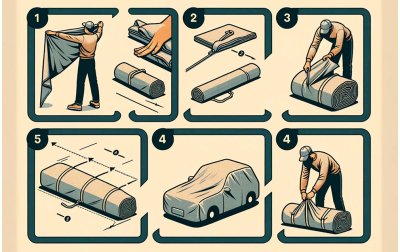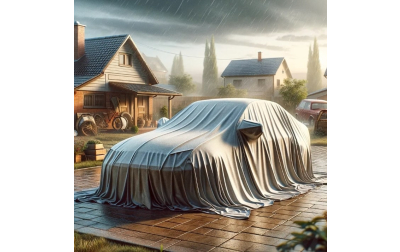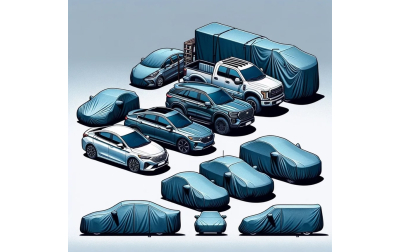
Is It a Good Idea to Cover Your RV?
When it comes to protecting your RV, one of the most common questions that RV owners ask is: Should I cover my RV when it's not in use? RV covers are marketed as essential for maintaining the condition of your vehicle, yet some people feel uncertain about their effectiveness or necessity. Covering an RV can offer a wide range of protective benefits, but there are also potential drawbacks. In this blog, we’ll explore all the aspects you should consider when deciding whether or not to cover your RV, including the pros and cons, factors to consider, and the best practices for covering your RV.
This article will cover:
- The Benefits of Covering Your RV
- Potential Drawbacks of RV Covers
- Factors to Consider When Deciding to Cover Your RV
- What Is the Best Way to Cover an RV?
- Should You Cover Your RV in the Summer?
The Benefits of Covering Your RV
One of the most significant advantages of using an RV cover is the protection it offers from the elements. UV rays, rain, snow, and wind can all damage your RV’s exterior, leading to fading, cracking, or corrosion over time. By using a cover, you create a barrier that protects against these environmental threats, extending the life of your RV's paint, roof, and other materials.
In addition to shielding your RV from UV damage, covers help prevent the accumulation of dust, grime, and bird droppings. If your RV is stored for long periods, a cover minimizes the time and effort needed for cleaning. Plus, a cover can prevent unwanted critters like rodents or insects from making a home in your RV, ensuring it’s ready for use whenever you are.
Covers can also provide insulation, which helps regulate the temperature inside your RV. In hot climates, a cover can help keep the interior cool, while in cold climates, it adds a layer of insulation against the cold. This protection helps safeguard your RV’s furnishings, electronics, and other interior elements from weather-induced damage.
Potential Drawbacks of RV Covers
While there are several benefits, RV covers also have some drawbacks. One common issue is moisture trapping. If moisture gets trapped under the cover, it can lead to mold, mildew, and rust, which may cause more damage than protection. It's essential to ensure that your RV is clean and dry before covering it and to use a breathable cover designed to allow moisture to escape.
The fit of the cover is another important consideration. A cover that fits too loosely can move around in the wind, causing friction that may scratch the paint or other surfaces. An ill-fitting cover can also be more susceptible to tearing or slipping off, reducing its effectiveness. Investing in a high-quality, custom-fitted cover that stays in place can help reduce these issues.
Finally, there's the matter of convenience. Putting on and taking off an RV cover can be a time-consuming task, especially for larger RVs. The added effort might not be worth it if you frequently use your RV or have access to alternative storage options, like a garage or covered parking.
Factors to Consider When Deciding to Cover Your RV
When deciding whether or not to cover your RV, several factors come into play. These include your local climate, how often you use the RV, and your storage options. Here’s a closer look at these considerations:
1. Climate and Weather Conditions
If you live in an area with harsh weather—extreme heat, heavy snowfall, or frequent rain—a cover can protect your RV from weather damage. For example, in a sunny climate, a UV-resistant cover will prevent sun-related fading and cracking, while a waterproof cover will shield it from snow and rain in colder areas.
Conversely, if you store your RV in a garage or under a carport, a cover may be less necessary, as indoor storage already provides sufficient protection.
2. Frequency of Use
If you use your RV frequently, the time spent putting on and removing the cover might feel like an unnecessary hassle. For RV owners who only take their vehicles out a few times a year, a cover can help prevent long-term wear and tear, making it worthwhile.
3. Type of Cover
The type of cover you choose is crucial. A breathable cover is ideal, as it prevents moisture buildup that can lead to mold and mildew. Custom-fitted covers are also beneficial, as they minimize movement and friction in windy conditions. Choosing a high-quality cover with appropriate UV resistance, waterproofing, and durability will provide the best protection for your specific climate.
What Is the Best Way to Cover an RV?
To ensure your RV is well-protected, start with a clean and dry vehicle. Choose a high-quality, breathable cover that fits snugly, and secure it with straps or elastic hems. If your RV has accessories on the roof, make sure the cover can accommodate these without causing damage. Regular checks are also recommended to ensure the cover stays in place and that no moisture is trapped underneath.
Should You Cover Your RV in the Summer?
Covering your RV during the summer is beneficial, especially in areas with intense sunlight. The UV rays can cause fading, cracking, and damage to both the exterior and interior of the RV. A UV-resistant cover acts as a protective shield, maintaining the condition of your vehicle.
However, in hot and humid climates, ensure the cover is breathable to prevent moisture buildup. If you use your RV frequently in the summer, consider the practicality of using a cover. For long-term summer storage, a cover provides excellent protection against sun damage.
Questions & Answers
- Why should I cover my RV? Covering your RV provides protection from UV rays, weather, and debris, which can help prolong its lifespan.
- Is it necessary to cover my RV if it’s stored indoors? Indoor storage offers some protection, but a cover can still be beneficial to protect against dust and minor scratches.
- Can an RV cover cause mold? Yes, if moisture gets trapped underneath. A breathable cover helps to minimize this risk.
- What type of RV cover should I buy? Look for a custom-fitted, breathable, and weather-resistant cover that suits your climate.
- How often should I check my covered RV? Check it every few weeks to ensure the cover is secure and that no moisture is trapped.
- Do RV covers prevent animal infestations? They can help, as they limit access points for pests like insects and rodents.
- Are there any downsides to covering an RV? Yes, covers can sometimes trap moisture or cause scratching if they fit poorly or are not breathable.
- Can I cover my RV with a tarp? Tarps are not ideal; they often lack breathability and custom fit, which can lead to scratching and moisture issues.
- How long does an RV cover last? Quality RV covers typically last 2-5 years, depending on usage and weather conditions.
- Is it hard to put on an RV cover? It can be, especially for larger RVs, but some covers come with installation aids to make the process easier.
















